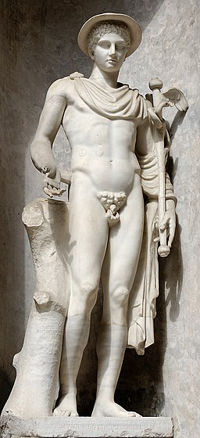
Hermes (Ἑρμῆς), the Olympian god of messengers, commerce, thieves, travelers, athletes, and shepherds, is one of the most versatile and dynamic figures in Greek mythology. Known for his cunning, speed, and charm, he served as the intermediary between the gods and mortals, navigating the realms of both with ease.
A God of Transitions and Boundaries
Hermes, the son of Zeus and the nymph Maia, was a master of crossing boundaries, both physical and metaphorical. He facilitated communication, guided souls to the Underworld, and protected those who traveled. His playful nature and quick wit made him a beloved, if sometimes mischievous, figure.
Key Attributes and Symbols
- Messenger of the Gods: Hermes' primary role was to deliver messages between the gods and mortals. His winged sandals and staff allowed him to travel swiftly and efficiently.
- God of Commerce and Trade: He was the patron of merchants, travelers, and those involved in business.
- Guide of Souls: Hermes Psychopompos escorted the souls of the deceased to the Underworld.
- God of Thieves and Trickery: His cunning and resourcefulness made him the patron of thieves and tricksters.
- Patron of Athletes and Sports: Hermes was associated with physical agility and athletic pursuits.
- Symbols: His symbols include the winged sandals (talaria), the winged helmet (petasos), the caduceus (a staff entwined with two serpents), the lyre, and the tortoise.
Myths and Legends
Hermes figures in numerous myths, showcasing his diverse roles and abilities:
- The Invention of the Lyre: As a newborn, Hermes stole Apollo's cattle and cleverly invented the lyre from a tortoise shell and the entrails of a cow. To appease Apollo, he gifted him the lyre.
- The Slaying of Argus: Hera tasked the giant Argus Panoptes, who had a hundred eyes, with guarding Io. Hermes, disguised as a shepherd, lulled Argus to sleep with his music and then slew him.
- The Rescue of Ares: When Ares was trapped in a bronze jar by the giants Otus and Ephialtes, Hermes rescued him.
- The Guide of Priam: During the Trojan War, Hermes guided King Priam to Achilles' tent to plead for the return of Hector's body.
- Perseus and the Helm of Hades: Hermes helped Perseus on his quest to slay Medusa, giving him advice and the adamantine sickle.
Hermes' Enduring Legacy
Hermes represents the importance of communication, adaptability, and resourcefulness. His role as the messenger of the gods highlights the need for clear and efficient communication, while his association with commerce emphasizes the value of trade and exchange.
Modern Relevance
Hermes' image continues to resonate in modern society, where communication and connectivity are paramount. He is often seen as a symbol of speed, agility, and quick thinking. His caduceus is a common symbol of medicine, though its origins lie in Hermes' role as a messenger and guide. He is also considered the patron of writers, orators, and all those who rely on the power of communication. His influence can be seen in literature, art, and popular culture, where he continues to be a captivating and multifaceted figure.
 Menu
Menu